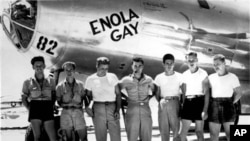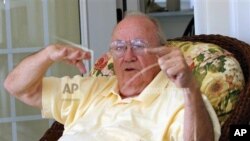The last surviving crewmember of the Enola Gay — the plane that dropped the first atomic bomb on Hiroshima, Japan, at the end of World War II — has died.
Theodore Van Kirk was 93 years old and living in a retirement home in Stone Mountain, Georgia, outside Atlanta.
Van Kirk was the navigator of the B-29 that dropped the bomb nicknamed "Little Boy" on Hiroshima on August 6, 1945. The blast killed as many as 140,000 people.
A second attack, on Nagasaki three days later, killed another 80,000. The bombings led Japan to accept the allied demand for unconditional surrender, ending World War II.
In an interview with the Associated Press in 2005, Van Kirk said wars and atomic bombs settle nothing and that he wanted to see the weapons banned.
Some information for this report comes from AP.






